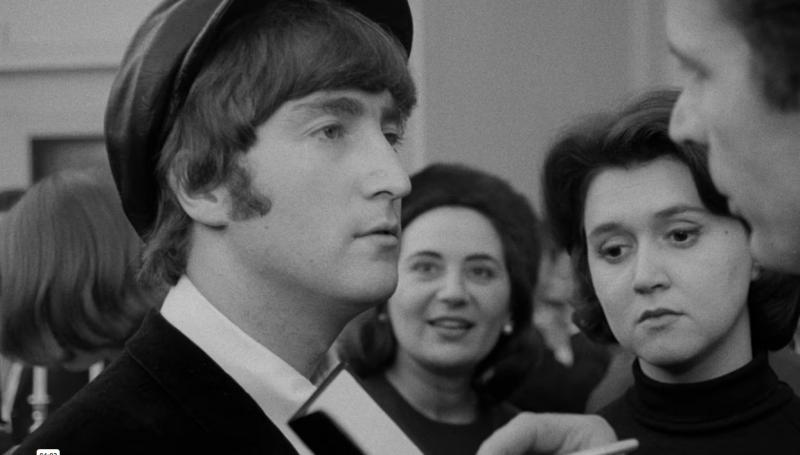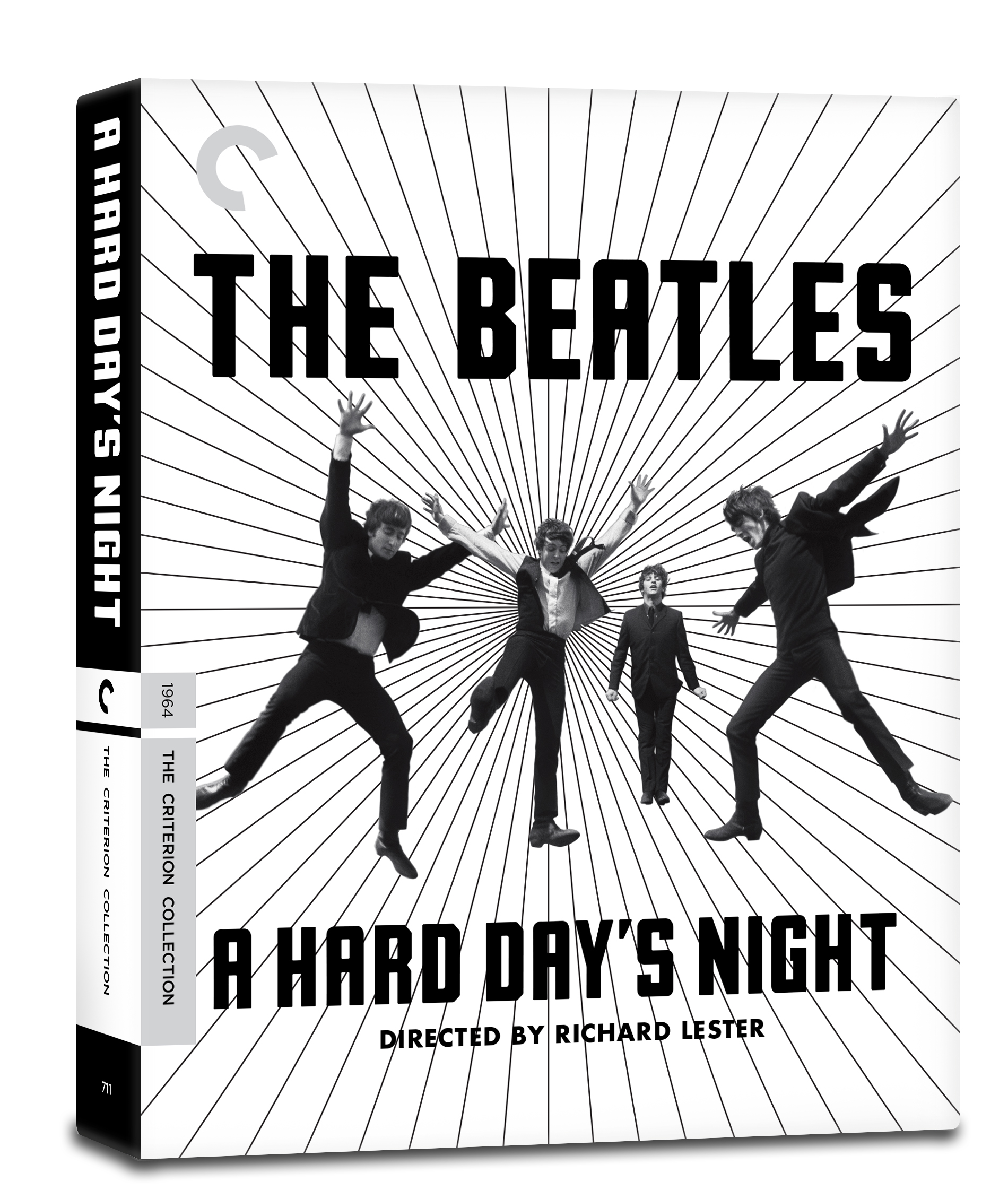Blu-ray: A Hard Day's Night | reviews, news & interviews
Blu-ray: A Hard Day's Night
Blu-ray: A Hard Day's Night
The 'Citizen Kane' of jukebox musicals? Richard Lester's film captures Beatlemania in full flight

Andrew Sarris, doyen of auteurist film critics, dubbed A Hard Day’s Night “the Citizen Kane of jukebox musicals”. Wild over-praise, or sly, back-handed compliment?
"Jukebox musical" connotes the sort of "exploitation film" Elvis churned out. Corporate suits with Dollar sign eyes may have wanted to exploit The Beatles, but the band were too savvy. Despite the fact that pop phenomena tended to fizzle out fast, meaning their time in the spotlight might be limited, The Beatles had refused several film offers before A Hard Day’s Night, holding out for something real, something, in John Lennon’s words, that “we will enjoy making and enjoy seeing”.
 There’s little currency in reviewing the film itself. It's indisputably a classic, and it features the greatest, most charismatic pop group of all time. (Perhaps you prefer the Rolling Stones? That’s like rating Vimto above Châteauneuf-du-Pape.) Let’s look at some of the extras instead. You Can’t Do That: the Making of A Hard Day’s Night is, despite being hosted by Phil Collins, enjoyable and wide-ranging, particularly the contributions of director Richard Lester and screenwriter Alun Owen.
There’s little currency in reviewing the film itself. It's indisputably a classic, and it features the greatest, most charismatic pop group of all time. (Perhaps you prefer the Rolling Stones? That’s like rating Vimto above Châteauneuf-du-Pape.) Let’s look at some of the extras instead. You Can’t Do That: the Making of A Hard Day’s Night is, despite being hosted by Phil Collins, enjoyable and wide-ranging, particularly the contributions of director Richard Lester and screenwriter Alun Owen.
Lester unpacks the film’s unique meld of elements and flavours: “Adapting the best bits of the French Nouvelle Vague into something that had a very earthy and English quality to it”. Owen, a Welsh Liverpudlian, had embedded himself on tour with The Beatles, establishing a rapport and observing their gilded cage existence. He captured The Beatles’ cadences, vernacular, and humour, scripting pithy bursts of the sort of things they might actually say. Owen’s sense of them as “prisoners of their success” manifests in the film’s first half, where they are continually in confined spaces, starting with the train from Liverpool to London, most emblematically when they perform in the literal cage of the baggage car, while a cluster of minxy "schoolgirls" (actually models, including Pattie Boyd, later Mrs George Harrison) reach through the bars in an attempt to paw them.
This builds to a release when the four escape down the fire stairs from the TV studio they’re due to perform in, and caper across a field to the tune of Can’t Buy Me Love. It’s a brief respite for them, and a metaphor for the sort of liberation the band’s music provided, what Ian MacDonald called “comparable to the joy of being let out of school early on a sunny afternoon”.
In Things They Said Today, Lester stresses how he intended the filming “to be as natural an experience as possible”, which is echoed by critic Roger Ebert: “There’s a realism, a spontaneity, an unrehearsed quality that comes across”. The dialogue often feels improvised, but almost never is.
The film acts as a sort of meta commentary on the kind of thing it could have been, but isn’t, in particular during the media satire sequence where George encounters a light entertainment producer (Kenneth Haigh) whose ‘trend setter’ business it is to subsume, castrate, and commodify youth culture.
Instead, as Lester notes, the film had the opposite effect: it “individualised” The Beatles, allowing them to emerge from the clichéd mop-top chrysalis the media had heretofore had them confined to. The sheer quality of the film led film critics to take it seriously, and by extension The Beatles. The Beatles play fictionalised versions of themselves, but weren’t they always doing that? A Hard Day’s Night’s self-referential aspects coalesce in the sequence where John Lennon, playing "John Lennon", is "mistaken" for John Lennon by Millie (Anna Quayle). The shot of Lennon looking quizzically into the mirror, before concluding “She looks more like him than I do”, could stand for the entire film. An Ouroboros of Beatlemania.
The Beatles play fictionalised versions of themselves, but weren’t they always doing that? A Hard Day’s Night’s self-referential aspects coalesce in the sequence where John Lennon, playing "John Lennon", is "mistaken" for John Lennon by Millie (Anna Quayle). The shot of Lennon looking quizzically into the mirror, before concluding “She looks more like him than I do”, could stand for the entire film. An Ouroboros of Beatlemania.
Beatles chronicler Mark Lewisohn is interviewed in The Road to A Hard Day’s Night, discussing the grim reality of post-WWII Liverpool and the fact that had National Service not been abolished, there’d have been no Beatles, as they would have been too busy “Hup to-ing on some parade ground”.
Emphasising The Beatles’ refusal to stand still or repeat themselves, Lewisohn points out that the band got bored when they couldn’t find a new challenge. He even posits, convincingly, that they were on the verge of splitting up due to boredom if Brian Epstein hadn’t tip-toed gingerly down those slippery Cavern steps and had his raucous, leather-clad epiphany.
In Their Own Voices is exactly that: a selection of audio Beatles interview clips played over footage of the film’s making, as well as the band in Abbey Road studios, newsreels, etc. It’s the next best thing to a Beatles commentary track. (Although the disc does also include a charming, ensemble cast and crew commentary.)
Anatomy of a Style offers expert analysis of the film’s visual style: the seductive power of the opening scenes, how “the kids run in, and you run in with them”; the way the experimental filmmaking parallelled The Beatles’ musical inventiveness; the importance of editing, including the clever mix of shots: the swish pans, blurs, and close-ups; the way the title sequence’s unscripted "tripping up" shot was used so effectively; the stacked profiles and light halos. Like The Beatles’ music, the film’s technique “liberates the artform”.
Oddly, there’s no mention of the film’s one major flaw, the anticlimactic final concert sequence. The audience is in ecstasy, but the band’s (mimed) performance is strangely inert. As Jonathan Gould wrote, it feels as though it’s “taking place behind a thick pane of glass”; the film’s “depiction of Beatlemania under these laboratory conditions could not have been much tamer had a real laboratory been used”.
Criterion’s transfer is beautiful, the elegant black and white photography adding to its timeless feel. Aaron Copland said, "If you want to know about the Sixties, play the music of The Beatles." If you want to know about The Beatles, watch A Hard Day’s Night. If you want to know (and enjoy) more about A Hard Day’s Night, you should buy this Blu-ray.
rating
Explore topics
Share this article
The future of Arts Journalism
You can stop theartsdesk.com closing!
We urgently need financing to survive. Our fundraising drive has thus far raised £49,000 but we need to reach £100,000 or we will be forced to close. Please contribute here: https://gofund.me/c3f6033d
And if you can forward this information to anyone who might assist, we’d be grateful.

Subscribe to theartsdesk.com
Thank you for continuing to read our work on theartsdesk.com. For unlimited access to every article in its entirety, including our archive of more than 15,000 pieces, we're asking for £5 per month or £40 per year. We feel it's a very good deal, and hope you do too.
To take a subscription now simply click here.
And if you're looking for that extra gift for a friend or family member, why not treat them to a theartsdesk.com gift subscription?
more Film
 Oslo Stories Trilogy: Sex review - sexual identity slips, hurts and heals
A quietly visionary series concludes with two chimney sweeps' awkward sexual liberation
Oslo Stories Trilogy: Sex review - sexual identity slips, hurts and heals
A quietly visionary series concludes with two chimney sweeps' awkward sexual liberation
 Sorry, Baby review - the healing power of friendship in the aftermath of sexual assault
Eva Victor writes, directs and stars in their endearing debut feature
Sorry, Baby review - the healing power of friendship in the aftermath of sexual assault
Eva Victor writes, directs and stars in their endearing debut feature
 Blu-ray: Who Wants to Kill Jessie?
Fast-paced and visually inventive Czech comedy
Blu-ray: Who Wants to Kill Jessie?
Fast-paced and visually inventive Czech comedy
 Oslo Stories Trilogy: Love review - freed love
Gay cruising offers straight female lessons in a heady ode to urban connection
Oslo Stories Trilogy: Love review - freed love
Gay cruising offers straight female lessons in a heady ode to urban connection
 Beating Hearts review - kiss kiss, slam slam
Romance and clobberings in a so-so French melodrama
Beating Hearts review - kiss kiss, slam slam
Romance and clobberings in a so-so French melodrama
 Materialists review - a misfiring romcom or an undercooked satire?
Writer-director Celine Song's latest can't decide what kind of film it is
Materialists review - a misfiring romcom or an undercooked satire?
Writer-director Celine Song's latest can't decide what kind of film it is
 theartsdesk Q&A: actor Leonie Benesch on playing an overburdened nurse in the Swiss drama 'Late Shift'
The Guildhall-trained German star talks about the enormous pressures placed on nurses and her admiration for British films and TV
theartsdesk Q&A: actor Leonie Benesch on playing an overburdened nurse in the Swiss drama 'Late Shift'
The Guildhall-trained German star talks about the enormous pressures placed on nurses and her admiration for British films and TV
 Freakier Friday review - body-swapping gone ballistic
Lindsay Lohan and Jamie Lee Curtis's comedy sequel jumbles up more than their daughter-mother duo
Freakier Friday review - body-swapping gone ballistic
Lindsay Lohan and Jamie Lee Curtis's comedy sequel jumbles up more than their daughter-mother duo
 Eight Postcards from Utopia review - ads from the era when 1990s Romania embraced capitalism
Radu Jude's documentary is a mad montage of cheesy TV commercials
Eight Postcards from Utopia review - ads from the era when 1990s Romania embraced capitalism
Radu Jude's documentary is a mad montage of cheesy TV commercials
 The Kingdom review - coming of age as the body count rises
A teen belatedly bonds with her mysterious dad in an unflinching Corsican mob drama
The Kingdom review - coming of age as the body count rises
A teen belatedly bonds with her mysterious dad in an unflinching Corsican mob drama
 Weapons review - suffer the children
'Barbarian' follow-up hiply riffs on ancient fears
Weapons review - suffer the children
'Barbarian' follow-up hiply riffs on ancient fears

Add comment